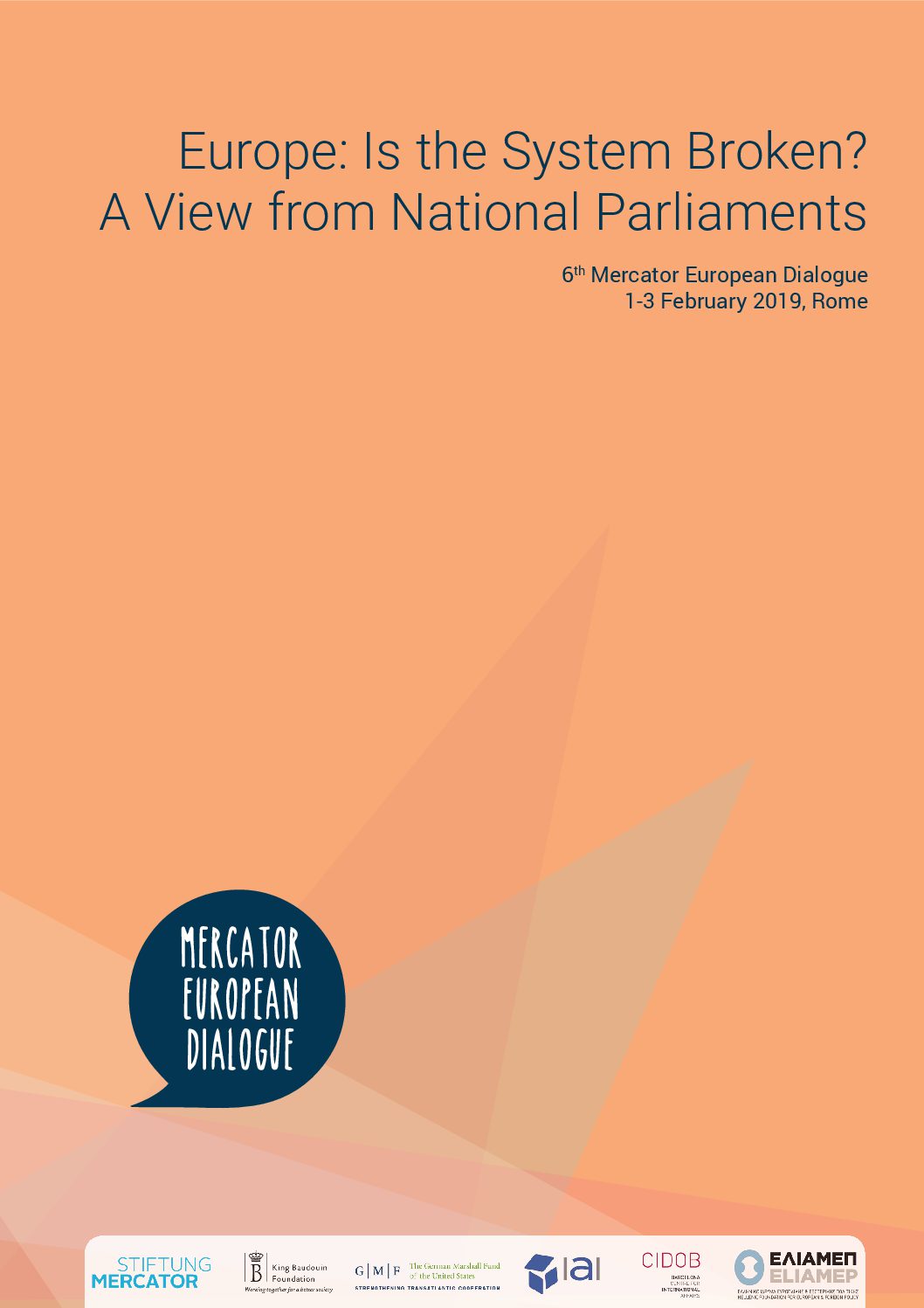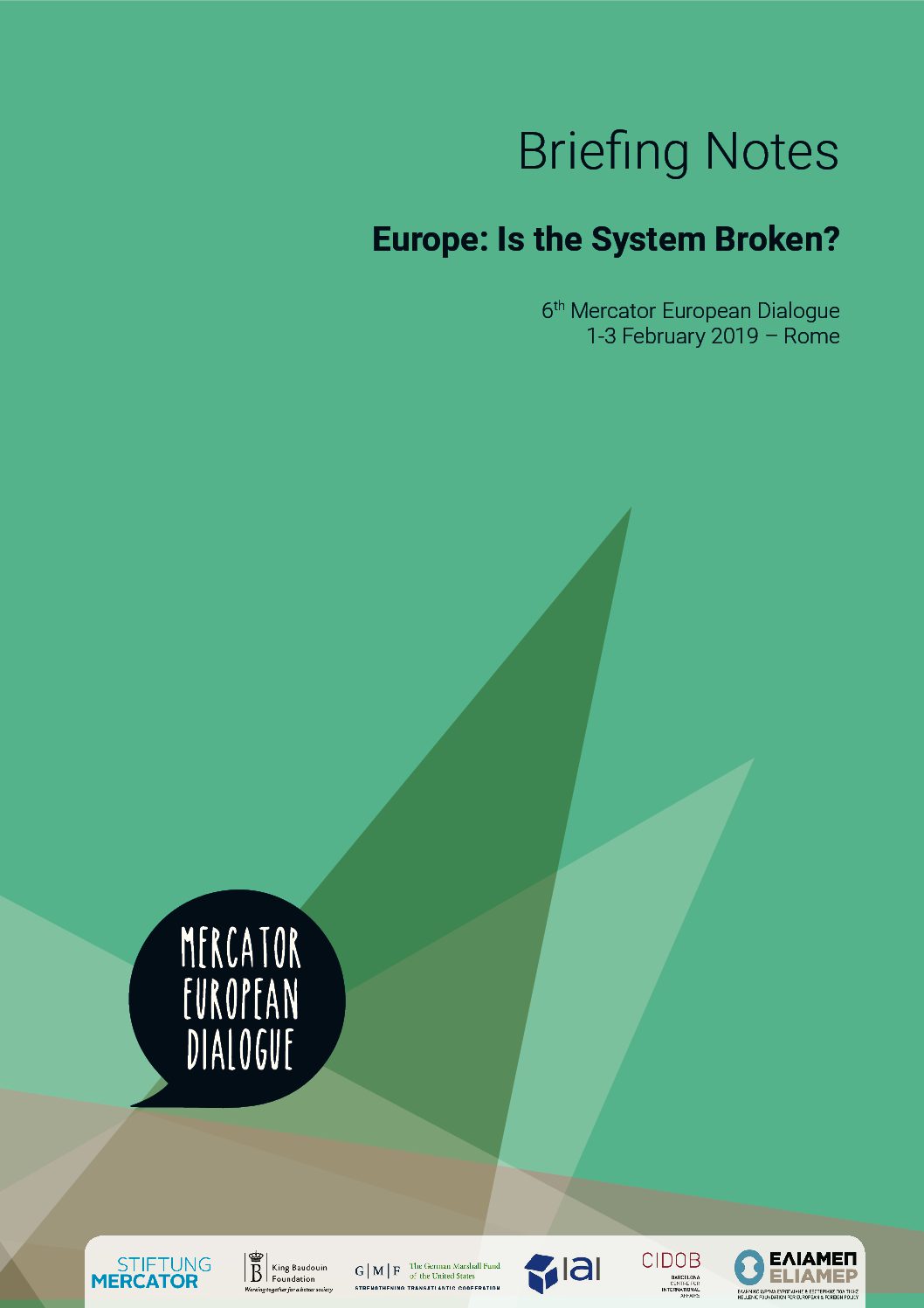
Judy Asks: Europe - Is the System Broken?
The latest edition of Carnegie Strategic Europe’s Judy Asks column, featuring members of the Mercator European Dialogue Network, was inspired by the 6th Mercator European Dialogue on the theme “Europe: Is the System Broken?”, in Rome on February 1–3, 2019.
At the 6th Mercator European Dialogue, 61 Members of Parliament from 22 different countries convened for two and a half days to discuss the fundamental failures perceived in Europe today. Carnegie Europe’s Judy Dempsey participated in the discussions and picked up the event’s guiding question in her bi-weekly ‘Judy Asks’ column at Carnegie Strategic Europe. The column features five members of parliament from the Mercator European Dialogue parliamentary network and three Mercator European Dialogue experts.
Below, you can find some of the highlights of the article. To read the full answers, click here.
Europe – Is the System Broken?
MARGARETA CEDERFELT | MEMBER OF THE SWEDISH PARLIAMENT The European system is not broken, but it is under pressure. What is needed is to build confidence between politics and society, politicians and voters. The EU must be kept intact. It means communication and dialogue.
ANGELOS CHRYSSOGELOS | BERGGRUEN-WEATHEREAD FELLOW AT THE WEATHERHEAD CENTER, HARVARD UNIVERSITY AND ASSOCIATE FELLOW IN THE EUROPE PROGRAMME AT CHATHAM HOUSE Yes, but that doesn’t mean that it will collapse any time soon. As the past decade of governance crises has shown, the EU suffers both from policy and representational deficits. On the one hand, governments have been unwilling to construct effective common tools so that these crises don’t emerge again: a eurozone fiscal capacity or a fair and binding asylum system. On the other hand, the halfhearted solutions that were devised, like bailouts and mandatory refugee quotas, pitted national democracies against each other. Policy stalemate and democratic discontent ended up reinforcing each other.
PÅL JONSON | MEMBER OF THE SWEDISH PARLIAMENT No, the system is not necessarily broken, but there is certainly a counter-revolution going on against the liberal international order and the European Union, which is a product of that order. Few of us saw this change coming five years ago. The challenges across Europe are rather similar. How do we interact and deal with the nationalist / populist parties, migration flows, and a lack of social cohesion within our societies? If the old political parties fail to come up with answers to those questions, this trend will continue and will cause permanent damage to Europe beyond Brexit.
YASMINE KHERBACHE | MEMBER OF THE FLEMISH PARLIAMENT No, the EU system is not broken, but it is failing us. The EU’s resilience has become almost proverbial—despite the threats it had to face and countless, ensuing doomsday stories. Nevertheless, its sometimes nerve-racking inertia, ice cold austerity dogmas, and inability to manage the refugee crisis caused levels of disappointment in the European project never seen before, and rightly so.
JUHA LEPPÄNEN | CHIEF EXECUTIVE OF DEMOS HELSINKI Europe is at crossroads. The promise of economic union, in which benefits would trickle down to European citizens, is not believed in any more. We see symptoms of this all around us. Trust in institutions is diminishing, radical movements are gaining momentum, and there’s a growing lack of aspirations toward the future. The European system of the industrial era has run out of steam. The system still runs, but fewer and fewer people believe in it. Europe needs to radically renew its sense of purpose for European citizens. This should be the core focus of the next EU Parliament and Commission.
ELENI PANAGIOTA | REARESEARCH FELLOW AT HELLENIC FOUNDATION FOR EUROPEAN AND FOREIGN POLICY It serves some to think so. They use the old cloak of national determination to push their countries toward illiberalism. They use Europe’s shortcomings to protect judicial independence in many countries, to fight off threats to media freedom, to promote social equality, to address migratory pressures—in order to build and impose their own grand vision of a fragmented and isolated Europe. Without a doubt, the system needs fixing. Asymmetries in power and policy outcomes and a timid approach to reform have distanced European citizens from Europe both emotionally and politically. System recalibration is feasible, but it requires both boldness and courage.
ANTOINETTE SANDBACH | MEMBER OF THE UK PARLIAMENT Since the 2008 financial crisis, the EU institutions and its member states have come under unprecedented strain. The economic cost of the sovereign debt crisis and the social cost of the migrant crisis have tested the strength of our system. This sparked the rise of populist movements, which has met with varying success. However, the image of the EU as a broken relic, soon to be overrun by populists and their allies, is premature. We have seen a rekindling of support for the EU—especially in light of Brexit.
GINTARĖ SKAISTĖ | MEMBER OF THE LITHUANIAN PARLIAMENT Trust in Europe’s future is not broken. We have many challenges to face as a prospering region. But these same challenges are being faced worldwide. They include income inequality, distrust in democratic institutions, and the changing speed of life. We do not have to blame the European Union for all our problems. But we should clearly identify what challenges have appeared because of the EU.




